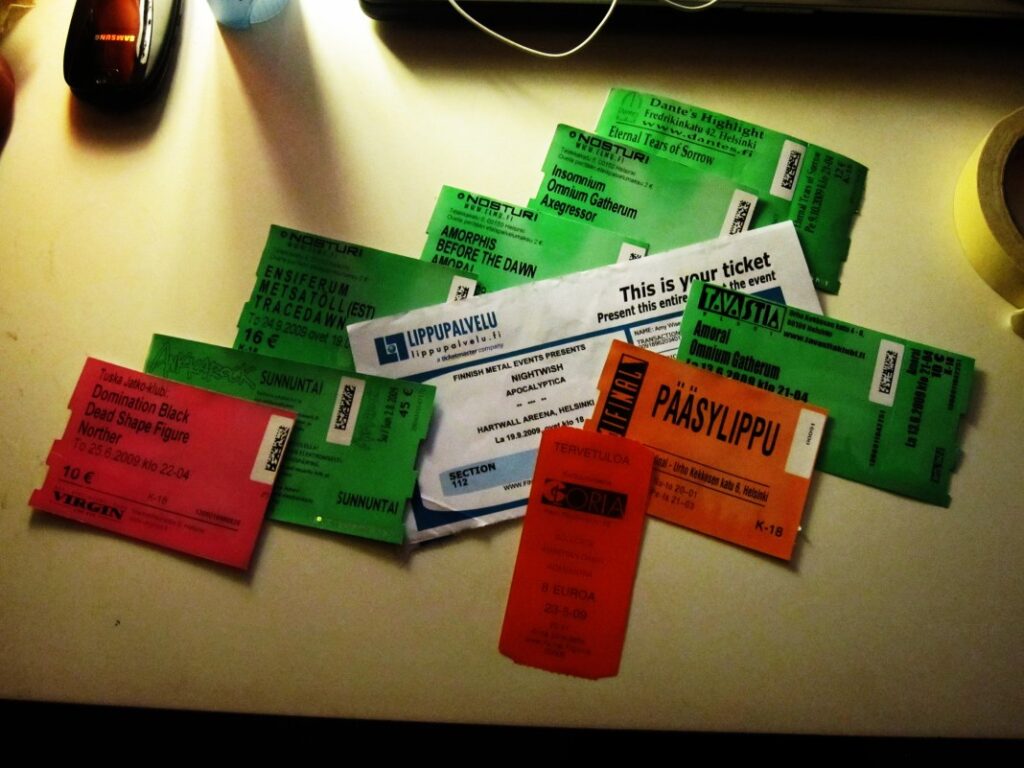It’s festival season yet again and many people out there will be selling concert and festival tickets for a discount because they aren’t able to get to the festival/show, and they’d rather sell a 125€ for 100€ than lose their money altogether. However, this is a common way for scammers to steal your money as well, so it’s wise to think things through carefully before you buy tickets from anyone online (particularly trade sites like Tori.fi and Huuto.net, among others).
To help avoid getting ripped off, here are a few things you can do:
SEARCH FOR SALES, DON’T POST REQUESTS
Scammers tend not to post their own advertisements (most of the time, not always), but they will reply to posts that go up for someone searching for tickets, regardless of whether the show is sold out or not. They will give you a fake story to make it sound legitimate too – you’re looking for one ticket, they might have two, the show is in Tampere but they’re in Rovaniemi and can’t make the trip down – they want it to be believable so you don’t question it. They are often quite quick on the draw too because they’re searching for people all the time, so if you put up an advertisement searching for a ticket and they respond in 30 minutes or less, that’s a red flag.
BUY PAPER TICKETS, NOT .PDFs
Scammers will rarely offer you a paper ticket, usually saying they will transfer a .pdf ticket to you via email; .pdf tickets are already questionable because if the person does have one, they could sell it to many people and you can’t be certain you’re getting the only copy, and it becomes a matter of who arrives at the venue first as to who gets to use it. If they have a paper ticket, there’s less of a chance of a scam. Likewise, if you’re buying tickets from a retailer to a show that you’re not 100% sure you can go to, it’s better to buy a paper ticket than a .pdf so that people will trust you more if you have to sell it.
SPEAK TO THE SELLER ON THE PHONE
Scammers use pre-paid phones and will use them to text you. As such, if someone texts you with an offer, call them back and discuss things in person. Scammers will never answer the phone.
ARRANGE A FALSE MEETING
If you have the time to do this before the show (as in, if it’s still a day or two before the show), arrange a false meeting with the person. If they claim to be in Oulu with a ticket to a show in Helsinki, say that you happen to be there at the moment too, and could buy it off them in person. If they’re willing to meet you to pass over the ticket, you can tell them that you were just checking to see if they were real and not a scammer, and chances are they won’t hold it against you. If they’re a scammer though, they’ll make excuses. Better safe than sorry, right?
PURCHASE IN PERSON WHEN POSSIBLE
With the above in mind, we can never really be certain of what we’re getting when we buy used tickets, so if at all possible, buy your tickets in a way that you ensure that you’ll be meeting the person face-to-face and you can double-check that the ticket is authentic and the dates and venue are correct. It’s more inconvenient, but a little inconvenience is better than stolen money.
ASK FOR PROOF OF PURCHASE OR ID
If the person selling you a ticket can’t prove they have one, well, don’t buy it! Scammers don’t post photos of their tickets because they don’t have them. You don’t need to see the bar code to know it’s real, just a photo of the ticket with the date and venue. Then, once you do have the proof photo, do a quick Google search to make sure the photo in question doesn’t match any other photos that could have easily been snagged online. If they’re unwilling to do so, ask them for a copy of their ID, a passport or something similar, to make sure you know who they really are.
THE GENTLEMAN’S RULE
Let’s say you’re living in Turku and have a ticket to Tuska, and someone in Helsinki wants to buy it, but neither of you is going to be in the same city at any point before the festival. I propose a gentleman’s rule in that, if you’re mailing a ticket, the buyer pays half and sends some proof (screenshot or receipt or whatever), the sellers sends the ticket, and the buyer pays the other half. Usually it just goes that the buyer puts their faith in the seller, but that’s not entirely fair. This rule allows both parties to take a more equal risk with one another.
WHAT IF IT HAPPENS ANYWAYS?
Okay, you’ve followed all these rules and still someone managed to scam you out of a ticket. What now? Simple: tell the police. Find your local police department and tell them what happened. You might feel foolish, you might not want to go to the police department, but do it anyways. If people don’t report these crimes, no one will ever get caught. And if you do, who knows, you might actually get your money back someday.
It’s great to help people out by taking their tickets off their hands, and it’s a good way to save a bit of money, particularly with festivals, but be sure that you think things through before making a commitment to buying a discounted ticket. Purchase safely, and see you at the shows!
Written by Bear Wiseman
Musicalypse, 2017-2020
OV: 6616
Recent posts
[recent_post_carousel design=”design-1″]





